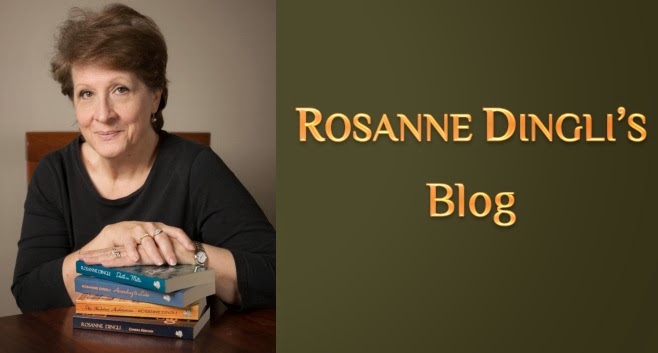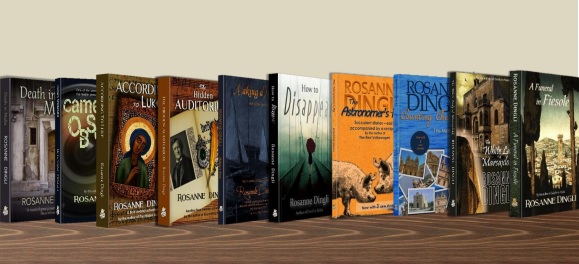That author is me: I take myself as the case in point and find some recurring themes in my writing - now that three of my novels are published, and a fourth is being written, it is certainly detectable. There are several aspects of the human condition I find fascinating, and they take over as I write.
Even without my knowing, they infiltrate my stories, and predominate. The careful reader will have noticed this some time ago, possibly even before I noticed that I am drawn to the way men of a certain age engage in affairs of the heart. Even before I understood my own fascination with the way locations affect people, perhaps, readers were twigging the fact that I am bowled over by some locations.
The things people 'know' and 'believe' do intrigue me. Belief and knowledge, especially when they dominate a life, move and inspire me. How can fully-grown adults allow a branch of knowledge, or a particular belief, take over their whole lives? It happens, and it's in my fiction ... several times over.
The aspects of human affection and love fascinate not only authors, but a great number of readers - which makes romance a very popular genre. And while I do not write strictly within the romance genre, the love and affection of my characters tends to colour my stories. I have also noticed that I am intrigued, struck and rather interested in avuncular male characters who imbibe the story with experience and wisdom. It took me a while to notice this, especially when I was still rather fond of writing short fiction.
 |
| Courtesy health.msn |
So am I preoccupied by ageing? By aspects of knowledge and belief? By relationships? By the way life's troubles and stresses get in the way of love? By the way a particular place on the globe colours a traveller's whole life? I must be, because I write a lot about these tendencies. I give my protagonists problems of the kinds I would not like myself, and am slightly scared of, but have often wondered about. This is telling.
I have found out that it is possible to discover more about an author than they might be willing to reveal about themselves.
If you are a reader - have you ever wondered about your favourite authors' preoccupations, and whether they surface in their fiction?
If you are an author, how conscious are you of your concerns and obsessions filtering through into your stories ... which, after all, are supposed to be fictions?





Hello Rosanne!
ReplyDeleteAs a writer, I am intensely preoccupied with them, and sometimes worry about what readers will think (as is my dear wife!). But then I remind myself that nothing I think or feel is unique to the rest of humanity, and we all have thoughts and feelings we'd rather not admit.
There's a scene in Diary of a Small Fish where our MC is expressing his hatred for the prosecutor who is framing him, and he has a very graphic image of smashing his elbow into the man's eye socket, then regrets the thought - not because of its violence, but because it came at a time he was grieving the death of his ex-wife.
In an MWA seminar, Reed Farrel Coleman told us that to portray character successfully,l we had to become truly unafraid to divulge our worst fears and thoughts.
Yes, but how scary that can be, and how revealing we feel it is, even though our readers might think is exceedingly creative, rather than simple use of our own experiences!
ReplyDeleteSome writers are self-conscious, and other devil-may-care... and I suppose the results of this are to be felt in their fiction. If it feels real, the author must have experienced it in SOME way, vicarious or not.
When 'they' say 'write what you know' this is what I take it to mean - that we infuse our writing with our experiences and analyses of the human condition and how we react to events, people, places and situations. We cannot do otherwise or our writing would become sterile and lifeless. Our plot and characters may be fictitious but the skill with which we bring them to 'life' makes them real. They resonate with the reader because we have found an authenticity with which to clothe them.That authenticity can only come from our personal understanding.
ReplyDeleteWow, Yvonne - yes, exactly so. Very well put, too. Not much I can add to that!
ReplyDeleteWell said. There are definitely threads that run through my work whether I want them to or not. :)
ReplyDeleteWhat a wonderful post and even though I've only written one long manuscript, I have written several stories and I think a good shrink could have a field day! LOL
ReplyDeleteI agree with what Yvonne has said. What shows in what we write shows our personal understanding of humanity. I've had people tell me that my characters are reflections of me. I do hope not. Some of them are horrible people who repel me and the only thing I have in common with them is that of species. At the same time, whether they are villains or heroes, they are amalgamations of what I have learned about humanity during my life. I'd hope that means they have layers and conflicts within them because that's makes them real.
ReplyDeleteI don't think as writers we can help but reveal our preoccupations and beliefs. A lot depends on the characters and situations we choose to write about.
ReplyDeletewww.daleharcombe.com